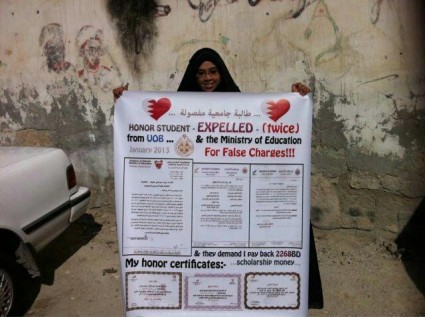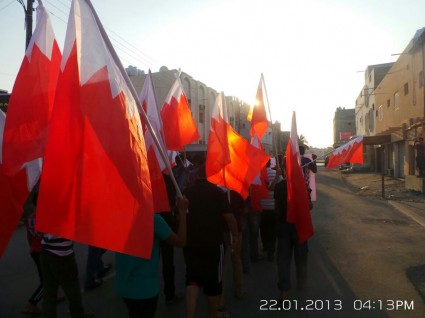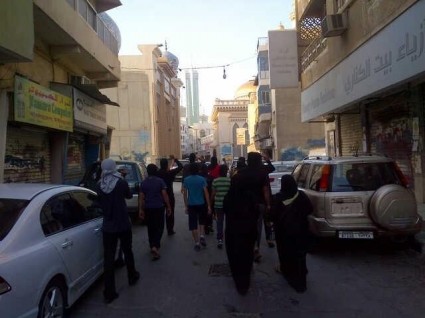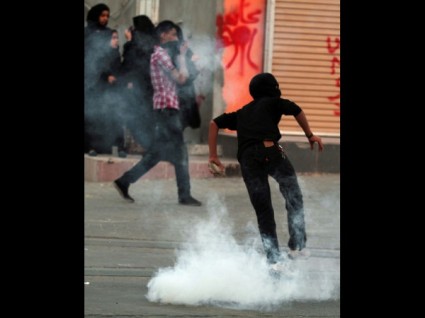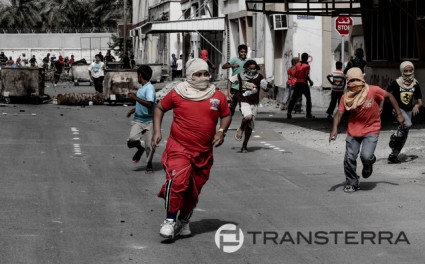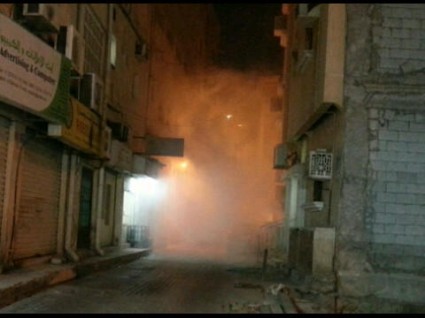Aker calls to stay the course of Revolution
January 23, 2013 No Comments
Bahrain: The Dignity Strike
January 23, 2013 No Comments
Bahrain Protest meets regime forces for dialogue of brutality
January 23, 2013 No Comments
Right to Education? Not in Bahrain, Protest and go to Jail
Bahrain: One-person protest for education and employment leads to arrest
19 January, 2013 – Bahrain Center for Human Rights
The Bahrain Center for Human Rights expresses its concern over the continued restrictions placed on freedom of expression in Bahrain. In two different incidents, citizens were arrested after staging one-person protest demanding basic rights.
On 16 January 2013, Zainab Abduali Taraif (20), an honors university student, was arrested after she stood silently near the financial harbor, holding a banner with her academic results and honor certificates, to protest against her second expulsion from the University of Bahrain for what she described as “false charges”. Zainab was one of over hundred students previously expelled in 2011 following the crackdown on protests. The reinstatement of the students was one of the recommendations suggested by the Bahraini Commission of Inquiry (BICI) in November 2011, and though most of them were indeed reinstated, several were expelled again in October 2012. …more
January 23, 2013 No Comments
Saudi Protest grow in Calls for Freedom of Political Prisoners
Saudis Stage Protest Rallies to Call for Freedom of Political Prisoners
21 January, 2013 – Amnesty International
TEHRAN (FNA)- Large crowds of people staged protest rallies across Saudi Arabia to condemn the Saudi regime’s crackdown on popular protests and call for the release of political prisoners.
Local media reports said that protests were held in a number of Saudi cities, including Riyadh, Medina, al-Dammam and Buraida.
During the rallies, protesters blasted the Saudi regime for its continued detention of citizens and activists and clampdown on protests.
The marchers chanted slogans for the release of political prisoners, and called on the international human rights groups to act for the freedom of those who have been held in prison for a long period of time without charge.
Earlier this month, Amnesty International said that a group of women protesters detained by the Saudi authorities must be released unless they are charged with an internationally recognizable crime.
At least 11 women are still believed to be in detention in the Central city of Buraida as well as in the capital Riyadh after being held at a protest in Buraida on 5 January, Amnesty International reported in January.
Saudi Arabia is witnessing daily popular protests to mark the deaths of at least 15 people in connection with protests in the country since last year.
Reports vary as to how those killed in connection with the protests lost their lives. Eyewitnesses have said that some of those who died were either not taking part in demonstrations or, if they were, posed little or no risk to the security forces.
All demonstrations are banned in Saudi Arabia, but they have been taking place in Saudi Arabia’s predominantly Shiite Muslim Eastern Province since February 2011 to protest the arrest, imprisonment and harassment of members of the Shiite community for holding collective prayer meetings, celebrating Shiite religious festivals and for breaching restrictions on building Shiite mosques and religious schools.
The demonstrations in the Eastern Province have been inspired in part by protests that swept the Middle-East and North Africa region in 2011.
The Saudi authorities have responded with repressive measures against those suspected of taking part in or supporting protests or of expressing views critical of the state.
Protesters have been held without charge and incommunicado for days or weeks at a time, and in some cases reportedly subjected to torture and other ill-treatment while in detention. …more
January 23, 2013 No Comments
Mali paves the road for War in Algeria
A long time in the making and announced by François Hollande six months in advance, the French intervention in Mali was portrayed as an emergency decision in response to dramatic developments. This scheme aims not only at seizing Mali’s gold and uranium, but more especially at paving the way for the destabilization of Algeria.
Mali: One war can hide another
by Thierry Meyssan – Voltaire Network – 21 January, 2013
Ever since Nicolas Sarkozy with Laurent Gbagbo, Muammar al-Gaddafi and Bashar al-Assad, the Kiss of Judas has been a characteristic of French diplomacy. In the photo, President François Hollande arrives in Algiers on December 10, 2012 to embrace his counterpart Abdelaziz Bouteflika. Three weeks later, he was stoking the flames of war in Mali to set Algeria ablaze.
“Appetite comes with eating”, says the proverb. After having re-colonised the Ivory Coast and Libya, then having attempted to get a hold on Syria, France is now setting its sights on Mali in order to take Algeria from behind.
During the attack on Libya, the French and the British made wide use of the Islamists to fight the power structure in Tripoli, since the Cyrenaican separatists had no interest in overthrowing Muammar al-Gaddafi once Benghazi became independent. At the fall of the Jamahiriya, I was personally witness to the reception of the leaders of AQMI (Al Qaida in Islamist Mahgreb) by members of the National Transitional Council in the Hotel Corinthia, which had just been secured by British special forces who had come from Iraq for that purpose. It was clear that the next target for Western colonialism would be Algeria, and that AQMI would play its part, but at that time I could not see which conflict could be used to justify international intervention.
Paris has imagined a scenario in which war will enter Algeria via Mali.
Shortly before NATO’s capture of Tripoli, the French managed to bribe and return the Tuareg groups. They had the time to supply them with abundant funds and weapons, but it was already too late for them to play a role on the ground. Once the war was over, they went back to their desert.
The Tuaregs are a nomad people who live in the central Sahara and on the borders of the Sahel, which is a vast area shared between Libya and Algeria, Mali and Niger. While they have obtained the protection of the first two states, they have been ignored by the last two. As a result, since the 1960’s, they have been challenging the sovereignty of Mali and Niger on their land. Quite logically, these groups, armed by France, have decided to use their weapons to impose their demands on Mali. The MNLA (National Movement for the Liberation of Azawad) has taken control over almost all of northern Mali, where they live. However, a small group of Tuareg Islamists, Ansar Dine, which is connected to AQMI, has taken advantage of this occupation to impose sharia law in some areas.
On the 21st of March 2012, a strange coup d’Etat was perpetrated in Mali. A mysterious group called CNRDRE ( National Commitee for the Recovery of Democracy and the Restoration of the State) overthrew President Amadou Toumani Touré and declared their intention to restore Malian authority in the north of the country. This resulted in great confusion, since the putschists were incapable of explaining how their actions would improve the situation. The overthrow of the President was even stranger since a presidential election was to be held five weeks later and the outgoing President was not running for office. The CNRDRE is composed of officers who were trained in the United States. They halted the election process and handed power to one of their candidates, who happened to be the Francophile Dioncounda Traore. This sleight of hand was legalised by the CEDEAO (Economic Community of West African States), whose President is none other than Alassane Ouattara, who was placed in power in the Ivory Coast by the French army a year earlier.
The coup d’Etat exacerbated ethnic divisions in the country. Elite units of the Malian army (trained in the United States), whose commander is a Tuareg, joined the rebellion, taking with them their arms and equipment.
On the 10th of January, Ansar Dine – supported by other Islamist groups – attacked the town of Konna. It then moves out of Tuareg territory to spread Islamic law to the south of Mali. The transitional President, Dioncounda Traore, declared a state of emergency and called to France for help. Paris intervened within hours to prevent the fall of the capital, Bamako. Far-sightedly, the Elysée had already pre-positioned in Mali troops from the 1st Marine Infantry Parachute Regiment (“the Colonials”) and the 13th Parachute Dragoon Regiment, helicopters from the COS (Special Operations Command), three Mirage 2000D’s, two Mirage F-1’s, three C135’s, a C130 Hercules and a C160 Transall.
In reality, it is highly unlikely that Ansar Dine represented any real threat, since the true combative forces are not Islamists, but Tuareg nationalists, who have no ambitions in the south of Mali.
In order to carry out its military intervention, France has turned to a number of countries for support, including Algeria. Alger is trapped – it either has to accept collaboration with an old colonial power, or take the risk of an influx of Islamists on its territory. After some hesitation, it agreed to open its airspace to French aviation. But then a non-identified Islamist group attacked a British Petroleum gas terminal in southern Algeria, accusing Algiers of complicity with Paris in the Malian affair. A hundred people were taken hostage, but they were not only Algerian and French. The aim of this attack is clearly to internationalize the conflict by transporting it to Algeria. …more
January 23, 2013 No Comments
Revolution’s Morning in Bahrain
January 23, 2013 No Comments
Mali: Neo-imperial occupation spreads across MENA in theft of mineral wealth
France war in Mali: Neo-imperialist grab dressed up in “war on terror” rhetoric
23 January, 2013 – By Finian Cunningham – PressTV
The conclusion is clear, France needed a pretext to go into Mali for several self-serving geopolitical reasons, including asserting political control over its client regime in Bamako with all the strategic resource advantages that that control entails. To achieve this, the French needed to militarise the political situation in Mali by sabotaging ongoing negotiations between the conflicting internal parties and to brand the country as an international security threat from “Islamic extremists.””
France’s intervention in Mali is simply this: a neo-imperialist power grab dressed up in “war on terror” rhetoric.
Since the old colonial power began bombing the West African country on 11 January, the Paris government has wrapped its actions up with chivalrous language of saving the region, Europe and indeed the world from “Islamic extremism”. France, we are led to believe, was “forced to act” on behalf of the beleaguered Francophile regime in Mali’s southern capital, Bamako, to save it from falling into the hands of “Islamists” allegedly “linked to Al Qaeda”.
But closer examination of background events shows that France sabotaged low-key attempts that were under way to find a political solution in Mali between the French-backed regime in Bamako and the northern separatist rebels. These talks and a ceasefire had opened only weeks before the French military intervention. The collapse of those negotiations paved the way for France to militarize the country – a step that now runs the risk of plunging the impoverished West African territory into years of internecine war. The cynical agenda is to create another failed state that will be more tightly under the political control of France, giving the French government a pretext to return to its former colony and the wider Francophone region.
Earlier this week, French Defense Minister Jean-Yves Le Drian let the cat out of the bag when he said that the aim was the “total re-conquest” of Mali.
Also, President Francois Hollande, in reply to questions about France’s role in Mali, played the “terror card.” He said, “I am often asked, ‘how long will this take?’ I answer, because it is the sole truth I know, ‘as long as necessary; the necessary time to defeat terrorism in that part of Africa.’”
Yet only days before this, the French were saying that their military operations would be over “in a matter of weeks.” Now, it seems, France is carving out a long-term role for itself in Mali. “We will leave no pockets of resistance,” says Le Drian. That sounds like a self-styled mandate for permanent presence.
This is a re-run of the American-led intervention in Afghanistan, where the “threat of Islamic extremism” has provided the moral, political and legal cover for NATO military occupation. That occupation is nothing but a criminal enterprise to give Western powers a foothold in the geo-strategic region of Central Asia. Likewise, the same agenda applies in West Africa. The Western puppet regime of President Hamid Karzai in Kabul is playing the same role as President Dioncounda Traore in Bamako. It is giving the Western powers, in this case France, a seeming mandate to wage war in a sovereign country, a war that would otherwise and rightly be seen as an imperialist act of aggression and illegal occupation. Note, that the other West African states are also backing France’s military involvement in Mali. But given their status as French client states, whose elite rulers are dependent on French patronage, their endorsement is more a sign of self-preservation than genuine concern for the people of Mali. …more
January 23, 2013 No Comments
Commander and Chief, Barack Obama, Shamefully Militarizes the Legacy of Martin Luther King Jr.
A repellent piece of propaganda appropriates the words and images of this nonviolence advocate to glorify US militarism
US military says Martin Luther King would be proud of its weapons
22 January, 2013 – Glenn Greenwald – guardian.co.uk
Yesterday, I highlighted the extraordinary anti-war speech Martin Luther King gave in 1967, in which he said, among other things, that the US government is “the greatest purveyor of violence in the world today” and the leading exponent of “the deadly Western arrogance that has poisoned the international atmosphere for so long.” The speech was devoted to arguing that America’s militarism and war-fighting were degrading the soul of the nation and the citizenry and – for financial, political and cultural reasons – were making domestic progress impossible.
The US Air Force’s Global Strike Command yesterday posted a truly vile bit of propaganda in which it appropriates King’s image, name and words in order to claim that he would “be proud to see our Global Strike team . . . standing side-by-side ensuring the most powerful weapons in the US arsenal remain the credible bedrock of our national defense” (ellipses in original):
“The Department of Defense is a leader in equal opportunity for all patriots seeking to serve this great nation. . . The vigilant warriors in AFGSC understand they are all equal and unified in purpose to provide a safe, secure and effective deterrent force for the United States. . . .
“Dr. King would be proud to see our Global Strike team – comprised of Airmen, civilians and contractors from every race, creed, background and religion – standing side-by-side ensuring the most powerful weapons in the US arsenal remain the credible bedrock of our national defense. . . Our team must overlook our differences to ensure perfection as we maintain and operate our weapon systems. . . Maintaining our commitment to our Global Strike team, our families and our nation is a fitting tribute to Dr. King as we celebrate his legacy.”
The US military – which is currently bombing Afghanistan, Pakistan, and Yemen at least, all in secret – just exploited one of the 20th Century’s greatest proponents of nonviolence and most vehement opponents of US militarism as a public face for its aggression and violence in the world. While King may have preferred to see an integrated military rather than one divided by racial strife, his condemnations of US militarism were particularly harsh when it came to the way the US military taught American citizens to embrace a culture of violence (“I knew that I could never again raise my voice against the violence of the oppressed in the ghettos without having first spoken clearly to the greatest purveyor of violence in the world today – my own government”).
The self-described mission of the Global Strike Command is to “develop and provide combat-ready forces for nuclear deterrence and global strike operations”. The US military is actually publicly claiming that the 1964 Nobel Peace Prize winner and steadfast critic of US imperialism would be an admirer of its massive stockpile of nuclear weapons, its global assassination programs, and its covert use of violence in multiple countries around the world, including where no wars are declared (in fairness, though, its Commander in Chief is himself a winner of the Nobel Peace Prize). Merely to describe this agitprop is to illustrate its repulsiveness. …more
January 23, 2013 No Comments

